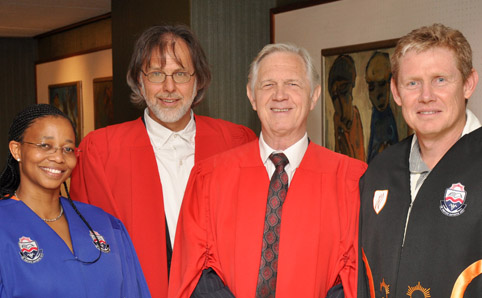Latest News Archive
Please select Category, Year, and then Month to display items
![]()
“A mind that is learning is a free mind and freedom demands the responsibility of learning” – J. Krishnamurti. What is the essence of education in our modern society amid the emerging, unprecedented, present-day circumstances? On 27 November 2020, third-year students from the University of the Free State (UFS) not only sought to inspire the youth in Kestell and bring them messages of hope, but also actively engaged them on how to be equipped with the necessary skills that would help them surf through the rapidly advancing world economics and the changing labour-market demands.
The collaboration with other expert stakeholders created a platform for significant conversation about alternative skills training that is designed to successfully address the current economic needs, thus enabling education to thrive and serve the intended purpose, which would ultimately manifest in effective transformation within communities. The UFS Qwaqwa Campus Community Engagement office coordinated the teamwork, comprising the Free State Department of Social Development, Maluti TVET College, the Free State School of Nursing, AGAPE Foundation for Community Development, Japie Lepele Foundation, the Riverside Finishing School, and Advance Academy.
TVET education allows students to progress in fields that suit them best and at the same time acquire skills needed for the future world of work. Information Technology (IT) students and staff members shared encouraging testimonies of their education experience and employment. The academy presented their finishing school programme to encourage learners to complete their secondary education even after they have suffered some interruptions. Although there are currently many challenges facing education in our semi-rural areas – such as Kestell – that result in lack of access to education and insufficient resources, civil partnerships like these are supporting and enabling communities in their quest to find their own solutions.
Professor suggests San place-name book
2011-09-28
|

|
At the inaugural lecture of Prof. Raper were, from left to right: Dr Choice Makhetha, Vice-Rector: External Relations (actg); Prof. Theo du Plessis, head of our Department of Language Management and Language Practice; Prof. Raper; and Prof. Lucius Botes, Dean of our Faculty of Humanities.
Photo: Stephen Collett
|
Prof. Peter Raper, Honorary Professor: Linguistics, in the Department of Language Management and Language Practice at our university, delivered his inaugural lecture on Tuesday, 27 September 2011. Prof. Raper focused on the topic of “Interpretations and translations of Bushman (San) place names” and he recommended the establishment of a chair for Khoikhoi and Bushman name studies at the UFS. Prof. Raper said that, until about 2 000 years ago, the Bushmen and their ancestors were the only inhabitants of southern Africa and that, presumably, all place names in the region were of Bushman origin. Prof. Raper also suggested the publication of a dictionary of Bushman place names which will contribute to restoring and preserving Bushman toponymic, linguistic and cultural heritage.
In his inaugural lecture, Prof. Raper distinguished between the terms Bushman and San. He said “the term Bushman was for a long time considered an insult and San was preferred. Recently, Bushman became preferable and San is considered an insult”.